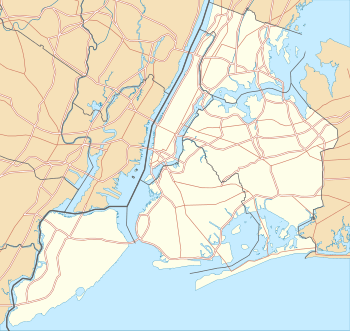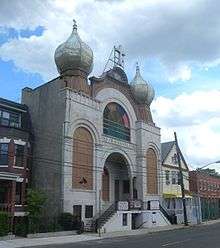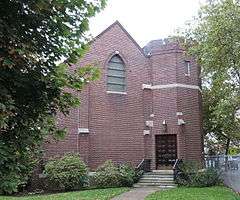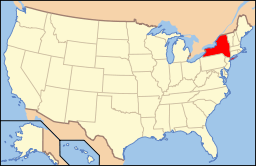Longwood Historic District (Bronx)
|
Longwood Historic District | |
|
St Margaret's Church | |
   | |
| Location | Bronx, New York, New York |
|---|---|
| Coordinates | 40°49′0″N 73°54′0″W / 40.81667°N 73.90000°WCoordinates: 40°49′0″N 73°54′0″W / 40.81667°N 73.90000°W |
| Built | 1898 |
| Architect | Multiple; Dickerson,Warren C. |
| Architectural style | Late 19th And 20th Century Revivals, Other, Romanesque |
| NRHP Reference # | 83001640[1] |
| Added to NRHP | September 26, 1983 |
The Longwood Historic District is a recognized historic district located in the center of the Longwood neighborhood in the South Bronx, New York. It encompasses about three square blocks roughly bounded by Beck Street, Longwood, Leggett, and Prospect Avenues.
The district consists of semi-detached rowhouses, most of which have been converted into S.R.O.'s (Single Room Occupancy).[2] The district includes 61 contributing buildings. It is primarily residential, but also includes the site of the former Prospect Hospital,[3] two churches (United Church and St. Margaret's Episcopal Church), and a much altered estate house (Patrolman P. Lynch Community Center).[4] Most of the semi-detached rowhouses were designed at the same time by one architect, Warren C. Dickerson.[5]

The New York City Landmarks Preservation Commission made it a historic district in 1980 and extended it in 1983. On September 26, 1983, the district was added to the National Register of Historic Places.
References
- ↑ National Park Service (2008-04-15). "National Register Information System". National Register of Historic Places. National Park Service.
- ↑ Longwood Historic District
- ↑ Kerr, Peter. "HOSPITAL SHUTS ABRUPTLY AND STATE PLANS INQUIRY". The New York Times. Retrieved 25 November 2015.
- ↑ "Cedars/Fox Hall". Retrieved 25 November 2015.
- ↑ Larry E. Gobrecht (June 1981). "National Register of Historic Places Registration: Longwood Historic District". New York State Office of Parks, Recreation and Historic Preservation. Retrieved 2011-01-12. See also: "Accompanying 12 photos".
- ↑ Feuer, Alan. "An Evolving South Bronx, Seen in Synagogues; As Jews Left, the Buildings Became Home to Churches, Clinics, and Even Jails". The New York Times. Retrieved 25 November 2015.



